牛津译林版(2019)必修 第二册>Unit 4 Exploring literature Grammar and usage & Integrated skills课件(共33张PPT)
文档属性
| 名称 | 牛津译林版(2019)必修 第二册>Unit 4 Exploring literature Grammar and usage & Integrated skills课件(共33张PPT) |

|
|
| 格式 | pptx | ||
| 文件大小 | 1001.8KB | ||
| 资源类型 | 教案 | ||
| 版本资源 | 牛津译林版(2019) | ||
| 科目 | 英语 | ||
| 更新时间 | 2023-11-03 18:27:47 | ||
图片预览

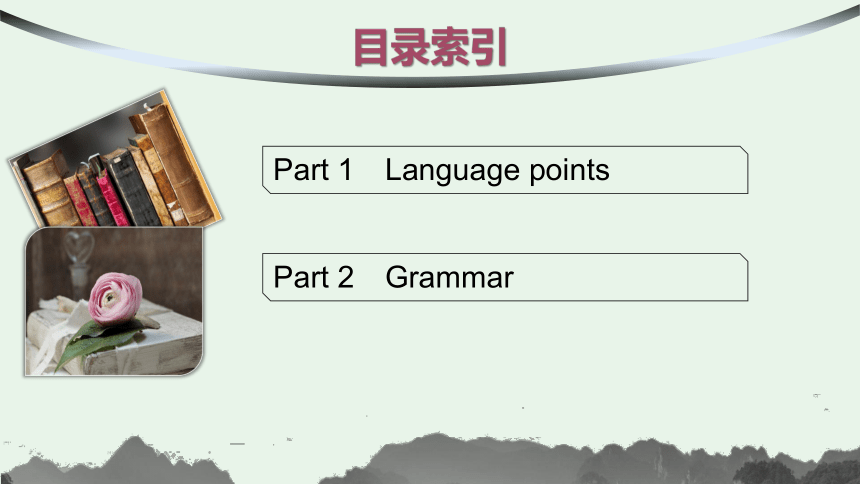
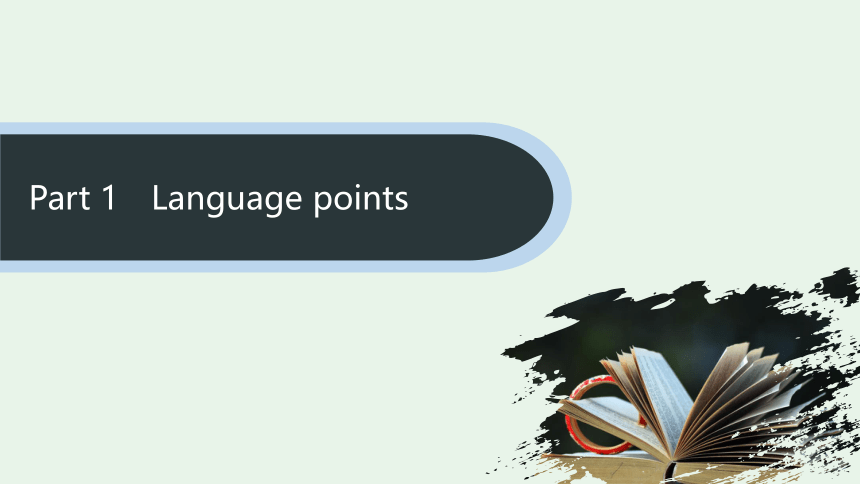
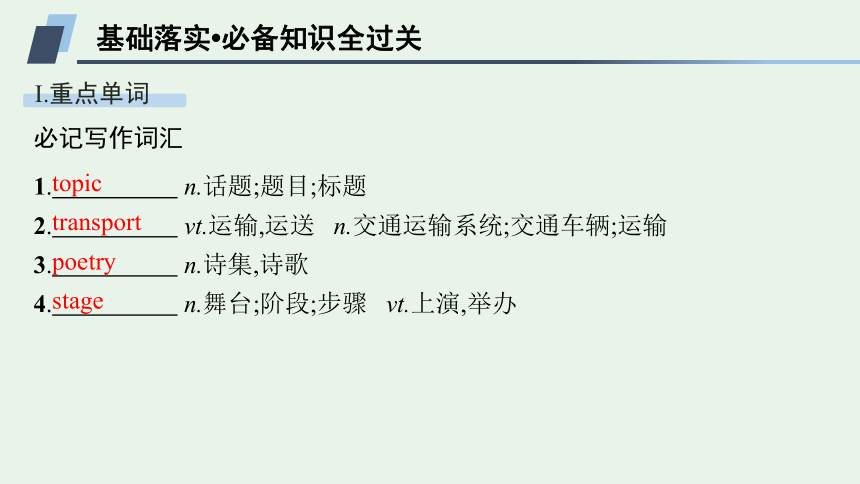
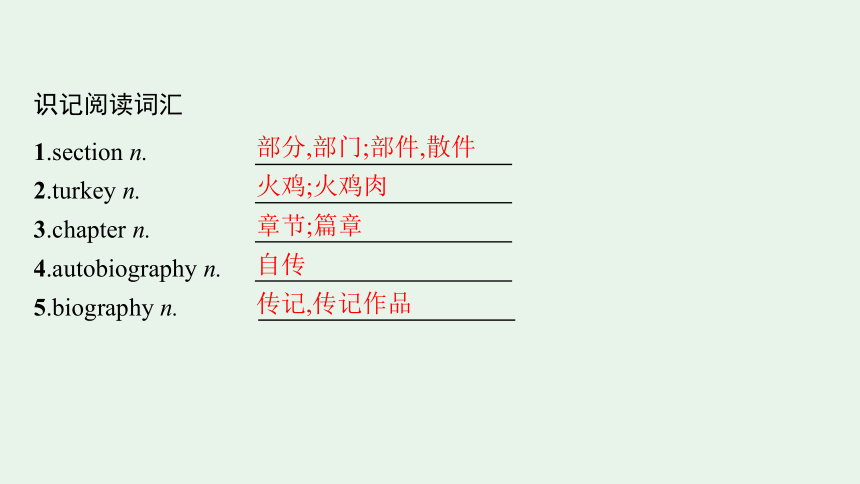
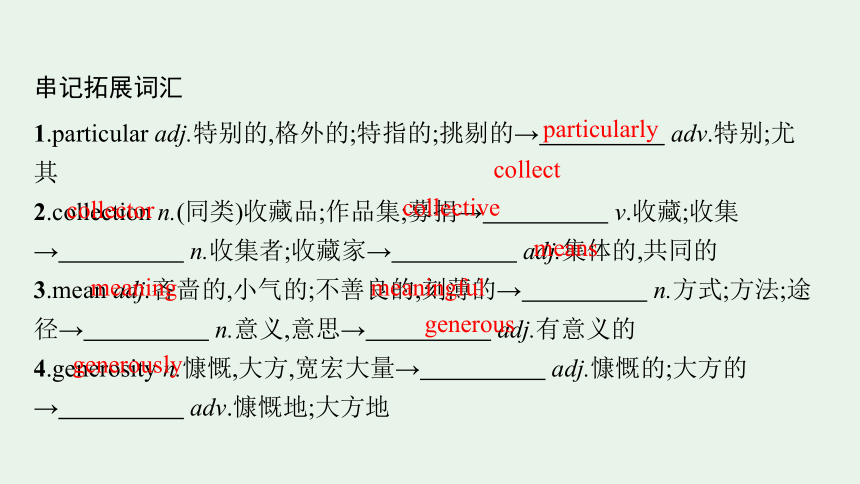
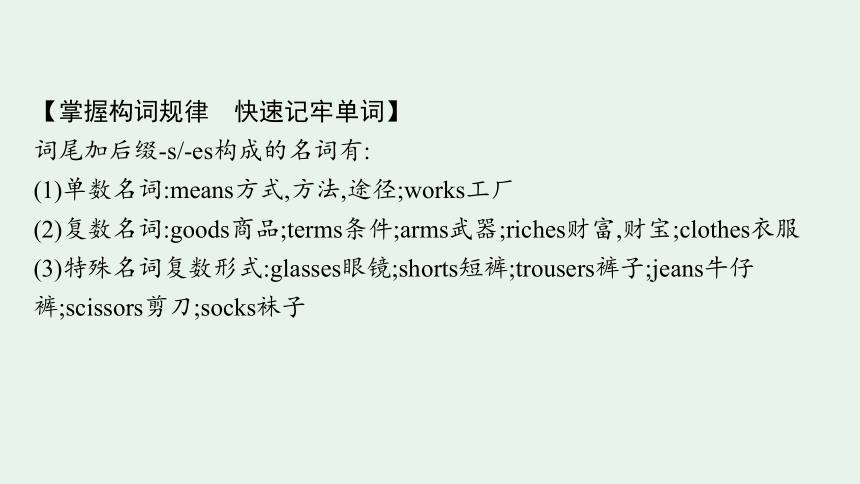
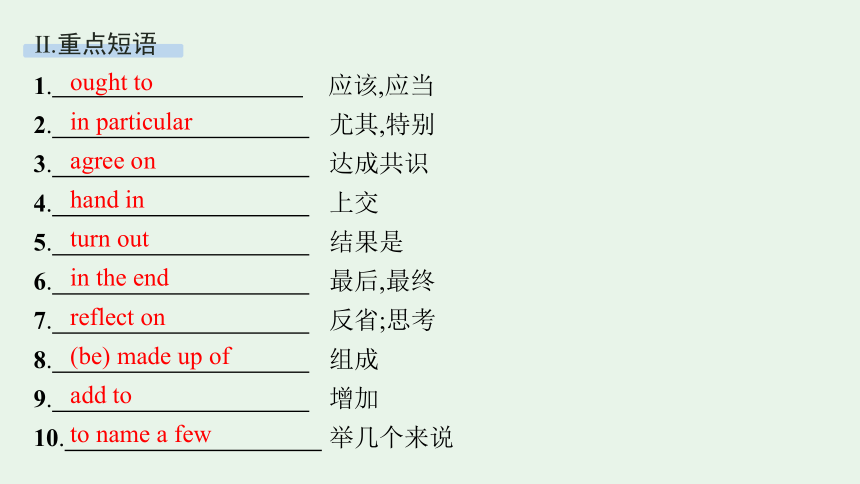
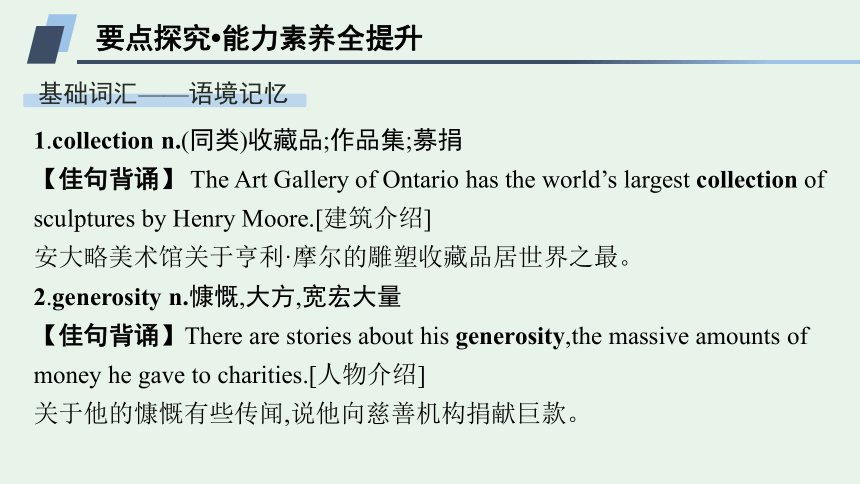
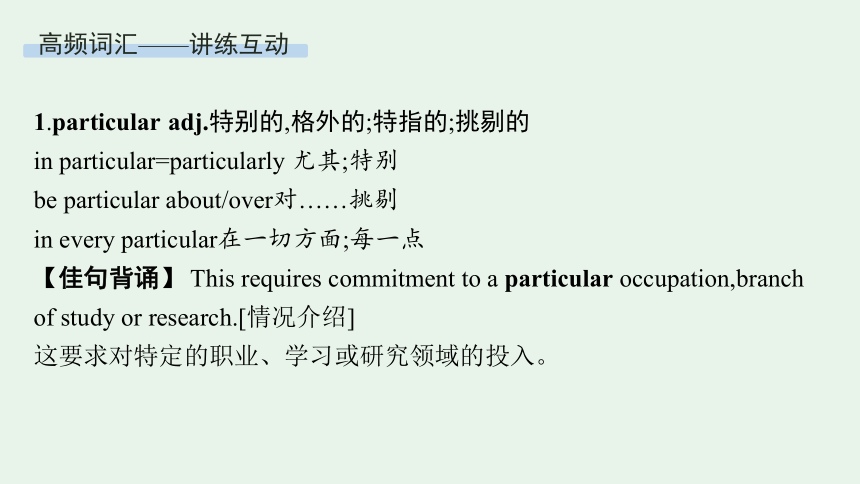
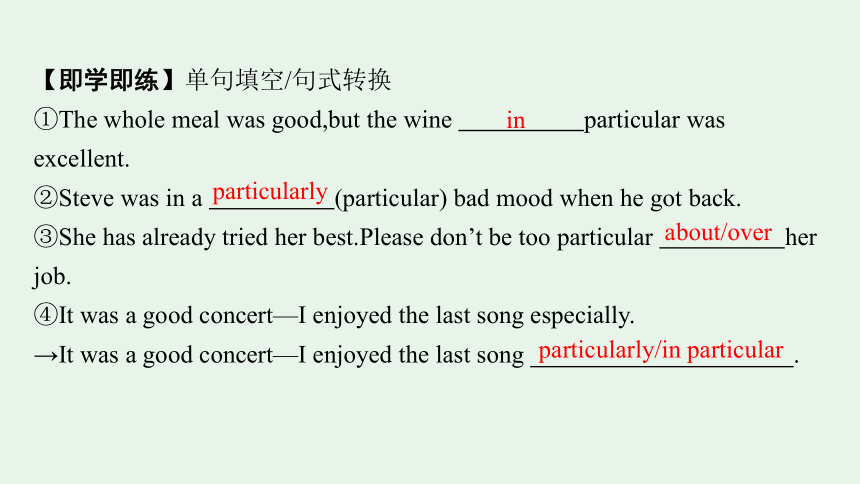
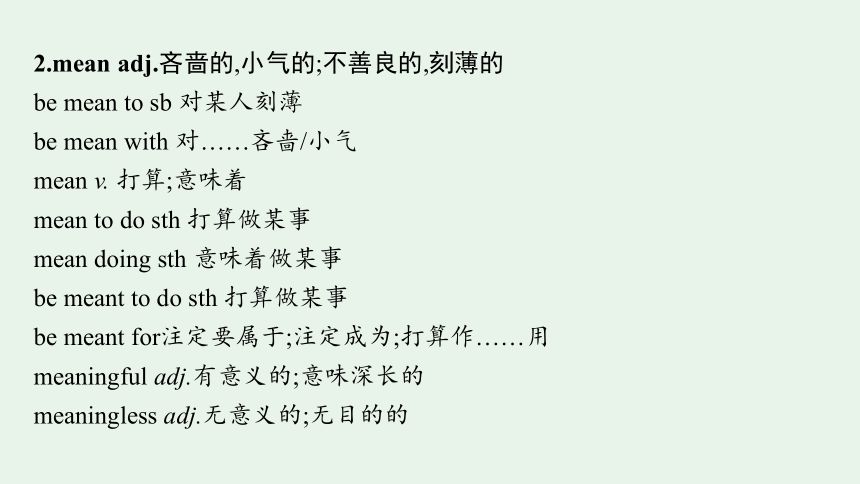
文档简介
(共33张PPT)
UNIT 4
Section B Grammar and usage & Integrated skills
Part 1 Language points
Part 2 Grammar
目录索引
Part 1 Language points
基础落实 必备知识全过关
Ⅰ.重点单词
必记写作词汇
1. n.话题;题目;标题
2. vt.运输,运送 n.交通运输系统;交通车辆;运输
3. n.诗集,诗歌
4. n.舞台;阶段;步骤 vt.上演,举办
topic
transport
poetry
stage
识记阅读词汇
1.section n.
2.turkey n.
3.chapter n.
4.autobiography n.
5.biography n.
部分,部门;部件,散件
火鸡;火鸡肉
章节;篇章
自传
传记,传记作品
串记拓展词汇
1.particular adj.特别的,格外的;特指的;挑剔的→ adv.特别;尤其
2.collection n.(同类)收藏品;作品集;募捐→ v.收藏;收集
→ n.收集者;收藏家→ adj.集体的,共同的
3.mean adj.吝啬的,小气的;不善良的,刻薄的→ n.方式;方法;途径→ n.意义,意思→ adj.有意义的
4.generosity n.慷慨,大方,宽宏大量→ adj.慷慨的;大方的
→ adv.慷慨地;大方地
particularly
collect
collector
collective
means
meaning
meaningful
generous
generously
【掌握构词规律 快速记牢单词】
词尾加后缀-s/-es构成的名词有:
(1)单数名词:means方式,方法,途径;works工厂
(2)复数名词:goods商品;terms条件;arms武器;riches财富,财宝;clothes衣服
(3)特殊名词复数形式:glasses眼镜;shorts短裤;trousers裤子;jeans牛仔裤;scissors剪刀;socks袜子
Ⅱ.重点短语
1. 应该,应当
2. 尤其,特别
3. 达成共识
4. 上交
5. 结果是
6. 最后,最终
7. 反省;思考
8. 组成
9. 增加
10. 举几个来说
ought to
in particular
agree on
hand in
turn out
in the end
reflect on
(be) made up of
add to
to name a few
要点探究 能力素养全提升
基础词汇——语境记忆
1.collection n.(同类)收藏品;作品集;募捐
【佳句背诵】 The Art Gallery of Ontario has the world’s largest collection of sculptures by Henry Moore.[建筑介绍]
安大略美术馆关于亨利·摩尔的雕塑收藏品居世界之最。
2.generosity n.慷慨,大方,宽宏大量
【佳句背诵】There are stories about his generosity,the massive amounts of money he gave to charities.[人物介绍]
关于他的慷慨有些传闻,说他向慈善机构捐献巨款。
高频词汇——讲练互动
1.particular adj.特别的,格外的;特指的;挑剔的
in particular=particularly 尤其;特别
be particular about/over对……挑剔
in every particular在一切方面;每一点
【佳句背诵】 This requires commitment to a particular occupation,branch of study or research.[情况介绍]
这要求对特定的职业、学习或研究领域的投入。
【即学即练】单句填空/句式转换
①The whole meal was good,but the wine particular was excellent.
②Steve was in a (particular) bad mood when he got back.
③She has already tried her best.Please don’t be too particular her job.
④It was a good concert—I enjoyed the last song especially.
→It was a good concert—I enjoyed the last song .
in
particularly
about/over
particularly/in particular
2.mean adj.吝啬的,小气的;不善良的,刻薄的
be mean to sb 对某人刻薄
be mean with 对……吝啬/小气
mean v. 打算;意味着
mean to do sth 打算做某事
mean doing sth 意味着做某事
be meant to do sth 打算做某事
be meant for注定要属于;注定成为;打算作……用
meaningful adj.有意义的;意味深长的
meaningless adj.无意义的;无目的的
【佳句背诵】The sudden thaw means that spring is here.[情况介绍]
一朝解冻,便意味着春天到来。
【即学即练】单句填空/句式转换
①Independence does not mean (shut) the door to the world.
②It may be mentioned in passing that this material is not meant___________ publication.
③The programme is meant (educate) people about traffic safety.
④The little girls had locked themselves in the room because Mack had been mean them.
⑤I meant to have told you about it,but I forgot to do so.
→I you about it,but I forgot to do so.
shutting
for
to educate
to
had meant to tell
3.stage n.舞台;阶段;步骤 vt.上演,举办
stage by stage逐步地,一步一步地;分阶段地
on stage在舞台上
on the stage在舞台上;在现阶段;当演员
in the stage在……时期;在……阶段
at this stage眼下
stage a ceremony/an event/an exhibition举行仪式/活动/展览
【佳句背诵】(2021·新高考全国Ⅰ卷)He said he became just as nervous as those playing instruments on stage.[人物介绍]
他说他和那些在舞台上演奏乐器的人一样紧张。
【即学即练】单句填空/单句写作
①Although teased about her fatness,the girl showed great confidence
the stage.
②People tend to work hard this stage of life.
③The police are building up a picture of the incident stage stage.
④(2021·新高考全国Ⅰ卷)...Ms Raspopova has once asked her husband to help her out stage.
⑤玛雅·安吉罗在20世纪70年代末首次将戏剧《我仍将奋起》搬上舞台。
Maya Angelou first _________ _________ _________And I Still Rise in the late 1970s.
on
at
by
on
staged the play
重点句式——多维剖析
whether引导的宾语从句
【教材原句】 A book review can often tell you whether a book is worth reading or not.
书评常常能告诉你一本书是否值得一读。
本句中“whether a book is worth reading or not”是宾语从句,whether意为“是否”,表明对陈述的事物不明确或不清楚,常用在ask,wonder,doubt等词后或与or not连用,引导宾语从句时通常情况下可与if互换。
whether除引导宾语从句外,还可引导主语从句、表语从句、同位语从句以及状语从句。
whether...or中的whether表示一种选择,其后可以跟介词短语或不定式短语。
【佳句背诵】(2021·天津卷) We all need to get involved in saving energy whether it’s at work,at home,or at school.[活动倡议]
无论是在工作中,在家里,还是在学校,我们都需要参与到节约能源的活动中来。
【即学即练】单句填空/单句写作
①You’d better decide for yourself whether (go) or not.
②(2021·浙江卷)If you ever get the impression that your dog can “tell”
you look content or annoyed,you may be onto something.
③不管我的功课忙不忙,我都会设法找时间和朋友们出去玩。
_______ _______ _______ _______ _______ _______ _______ ________,
I’ll manage to find time to hang out with my friends.
to go
whether
Whether I’m busy with the lessons or not
Part 2 Grammar
语法冲关 语言规则全理清
情景导入
情态动词
Li Fang couldn’t read for a week with a headache.Her mother told her that she should go to the hospital and see a doctor as soon as possible.She added,“You might need glasses.”
Li Fang went to the hospital.The appointment clerk said that the doctor could see her at 3:30.Li Fang replied that she would not be able to be there at 3:30 because she had a class then.“Shall I put you down for ten to four ” the appointment clerk suggested.Li Fang thought she shouldn’t waste any more time.So she replied,“I think I can make it at ten to four.”
Li Fang went to the class.She asked her teacher,“May/Can I leave at 3:45 today I must/have to have an eye examination.” As expected,the teacher said,“Yes,of course you can.”
【语法感悟】
观察以上短文中的黑体部分可知,文中使用了大量的情态动词。can/could表示 ,也可表示可能性或许可。may/might常表示“许可”,也可以用于推测,表示“ ”。must表示“必须”。should/ought to表示“应该/按说应该”。而mustn’t则表示“禁止,不允许”。shouldn’t/oughtn’t to表示“ ”。needn’t相当于don’t have to,表示“没有必要”。
能力
可能
不应该
语法精讲
情态动词,即表示人的情感和态度的动词,它们本身有一定的词义,但是不能独立作谓语,只能跟动词原形一起构成谓语。情态动词虽然数量不多,但用途广泛。常见的情态动词主要有:can(could),may(might),must,need, shall(should),will(would),dare等。
一、情态动词的基本用法
1.表示“能力(ability)”。表示“能力”时,can用于表示现在或将来的能力,could用于表示过去的能力,be able to可用于各种时态。
(2021·新高考全国Ⅰ卷)The two children could finish cooking a breakfast,which she didn’t expect.
两个孩子做完了早餐,这是她没有想到的。
As a result,humans can perform very complex tasks with their hands.
因此,人类能用手完成非常复杂的任务。
Luckily I was able to catch them and put them back.
幸运的是,我能抓住它们,把它们放回去。
2.表示“可能性(probability)”。can,could,may,might都可以表示可能性,而且这四个词的可能性大小是依次由大到小递减的。
(2021·新高考全国Ⅰ卷) Our aim was to see if we could live,in some way,like real Parisians.
我们的目标是看看我们是否在某种程度上可以活得像真正的巴黎人。
Jim says we can stay in his house as long as we leave it clean and tidy.
吉姆说,只要我们保持房子干净整洁,我们就可以在他的房子里暂住。
Other problems may follow.
其他问题也许会随之而来。
(2021·浙江卷)He always had a sense of curiosity,wondering what new role or challenge might be just around the corner.
他总是有一种好奇心,想知道什么新的角色或挑战即将到来。
3.表示“建议(suggestion)”。should,ought to,had better都可以表示向别人提出建议。had better语气最弱。
(2021·全国甲卷)One of the ground rules of the swap should be that everyone must try on the clothes before they take them...
交换衣服的基本规则之一应该是,每个人在拿衣服之前都必须试穿……
—Shall I order a taxi for Sarah to go to the airport tonight
—Don’t bother.I’ll drive her there.
——今晚我为莎拉叫一辆出租车去机场好吗
——不用麻烦了。我开车送她去。
In order to get more clicks,you’d better tell me which Chinese culture you westerners prefer.
为了获得更多的点击量,你最好告诉我你们西方人更喜欢哪种中国文化。
4.表示“必要性(necessity)”。need,must,have to,shall等都可以表示“必须,必要”,可以说成是表示命令或奉劝,但must表示主观意愿,need和have to表示客观上必须怎样。mustn’t则表示禁止。
(2021·新高考全国Ⅰ卷)The hot spring at the foot of the mountain is something you must try after the climb.
山脚下的温泉是你爬山之后一定要去尝试的东西。
(2021·浙江卷)Unless I have to be out of town,each week I take my mother to do her shopping and visit the doctor...
除非我必须出城,否则每周我都会带我母亲去购物和看医生……
You must/have to be careful with the camera.It costs!
你必须小心使用这台相机。它很贵的!
I love the weekend,because I needn’t get up early on Saturdays and Sundays.
我喜爱周末,因为在周六和周日我无须早起。
5.表示“请求(request)或许可(permission)”。can,could,may,might,will,would,shall等都可以表示请求或许可。might语气最委婉。
Would you like the opportunity to earn extra cash close to home
你想有机会在家附近赚点外快吗
What about dessert Can I still have ice cream
甜点呢 我还能吃冰激凌吗
Will you please tell me the way to the post office
请你告诉我去邮局的路好吗
二、“情态动词+have done”结构的用法
1.must have done表示对过去发生的事情所作出的合理或很有把握的推测,意为“想必/准是/一定……”,只用于肯定句中,在否定句或疑问句中通常被“can/can’t+have done”代替。
Steam engines were used to pull the carriages and it must have been fairly unpleasant for the passengers,with all the smoke and noise.
蒸汽机被用来拉车厢,周围到处都是烟雾和噪声,对乘客来说一定很不舒服。
2.can have done一般用于疑问句和否定句中,用于表示对过去所发生事情的推测。could have done用于肯定句时,表示“可能已经做过某事”或“本有能力做某事而未做”。
George can’t have gone too far.His coffee is still warm.
乔治不可能走很远,因为他的咖啡还是热的呢。
3.should/ought to have done表示“过去本应该做某事而(实际上)没有做”,含有责备或遗憾的语气;其否定形式表示“某种行为不该发生却发生了”。
You shouldn’t have scolded him for his poor performance.After all,he had done his best.
你本不应该因为他表现不佳而责骂他。毕竟,他已经尽力了。
4.need have done表示“本需要做而实际未做”;needn’t have done表示“本不必做某事而实际做了”。
As it turned out to be a small house party,we needn’t have dressed up so formally.
原来这是一个小型的家庭聚会,我们本来没必要穿得那么正式。
5.may/might have done表示对过去发生的事情的推测,意思是“也许已经做了某事,可能已经做了某事”,多用在肯定句中,用might时表示语气更加不肯定。
You might have read about the news in the papers.
你可能已经在报纸上看过这个消息了。
【即学即练】用适当的情态动词填空
①—Excuse me,do you mind if I open the window
—Well,if you .I can put on more clothes.
②Lack of sleep lead to the weakened immunity and memory,and also slow physical growth.
③Children not be allowed to play in the street.
④The law is equally applied to everyone.No one be above it.
⑤You be Carol.You haven’t changed a bit after all these years.
must
can
should
shall
must
本 课 结 束
UNIT 4
Section B Grammar and usage & Integrated skills
Part 1 Language points
Part 2 Grammar
目录索引
Part 1 Language points
基础落实 必备知识全过关
Ⅰ.重点单词
必记写作词汇
1. n.话题;题目;标题
2. vt.运输,运送 n.交通运输系统;交通车辆;运输
3. n.诗集,诗歌
4. n.舞台;阶段;步骤 vt.上演,举办
topic
transport
poetry
stage
识记阅读词汇
1.section n.
2.turkey n.
3.chapter n.
4.autobiography n.
5.biography n.
部分,部门;部件,散件
火鸡;火鸡肉
章节;篇章
自传
传记,传记作品
串记拓展词汇
1.particular adj.特别的,格外的;特指的;挑剔的→ adv.特别;尤其
2.collection n.(同类)收藏品;作品集;募捐→ v.收藏;收集
→ n.收集者;收藏家→ adj.集体的,共同的
3.mean adj.吝啬的,小气的;不善良的,刻薄的→ n.方式;方法;途径→ n.意义,意思→ adj.有意义的
4.generosity n.慷慨,大方,宽宏大量→ adj.慷慨的;大方的
→ adv.慷慨地;大方地
particularly
collect
collector
collective
means
meaning
meaningful
generous
generously
【掌握构词规律 快速记牢单词】
词尾加后缀-s/-es构成的名词有:
(1)单数名词:means方式,方法,途径;works工厂
(2)复数名词:goods商品;terms条件;arms武器;riches财富,财宝;clothes衣服
(3)特殊名词复数形式:glasses眼镜;shorts短裤;trousers裤子;jeans牛仔裤;scissors剪刀;socks袜子
Ⅱ.重点短语
1. 应该,应当
2. 尤其,特别
3. 达成共识
4. 上交
5. 结果是
6. 最后,最终
7. 反省;思考
8. 组成
9. 增加
10. 举几个来说
ought to
in particular
agree on
hand in
turn out
in the end
reflect on
(be) made up of
add to
to name a few
要点探究 能力素养全提升
基础词汇——语境记忆
1.collection n.(同类)收藏品;作品集;募捐
【佳句背诵】 The Art Gallery of Ontario has the world’s largest collection of sculptures by Henry Moore.[建筑介绍]
安大略美术馆关于亨利·摩尔的雕塑收藏品居世界之最。
2.generosity n.慷慨,大方,宽宏大量
【佳句背诵】There are stories about his generosity,the massive amounts of money he gave to charities.[人物介绍]
关于他的慷慨有些传闻,说他向慈善机构捐献巨款。
高频词汇——讲练互动
1.particular adj.特别的,格外的;特指的;挑剔的
in particular=particularly 尤其;特别
be particular about/over对……挑剔
in every particular在一切方面;每一点
【佳句背诵】 This requires commitment to a particular occupation,branch of study or research.[情况介绍]
这要求对特定的职业、学习或研究领域的投入。
【即学即练】单句填空/句式转换
①The whole meal was good,but the wine particular was excellent.
②Steve was in a (particular) bad mood when he got back.
③She has already tried her best.Please don’t be too particular her job.
④It was a good concert—I enjoyed the last song especially.
→It was a good concert—I enjoyed the last song .
in
particularly
about/over
particularly/in particular
2.mean adj.吝啬的,小气的;不善良的,刻薄的
be mean to sb 对某人刻薄
be mean with 对……吝啬/小气
mean v. 打算;意味着
mean to do sth 打算做某事
mean doing sth 意味着做某事
be meant to do sth 打算做某事
be meant for注定要属于;注定成为;打算作……用
meaningful adj.有意义的;意味深长的
meaningless adj.无意义的;无目的的
【佳句背诵】The sudden thaw means that spring is here.[情况介绍]
一朝解冻,便意味着春天到来。
【即学即练】单句填空/句式转换
①Independence does not mean (shut) the door to the world.
②It may be mentioned in passing that this material is not meant___________ publication.
③The programme is meant (educate) people about traffic safety.
④The little girls had locked themselves in the room because Mack had been mean them.
⑤I meant to have told you about it,but I forgot to do so.
→I you about it,but I forgot to do so.
shutting
for
to educate
to
had meant to tell
3.stage n.舞台;阶段;步骤 vt.上演,举办
stage by stage逐步地,一步一步地;分阶段地
on stage在舞台上
on the stage在舞台上;在现阶段;当演员
in the stage在……时期;在……阶段
at this stage眼下
stage a ceremony/an event/an exhibition举行仪式/活动/展览
【佳句背诵】(2021·新高考全国Ⅰ卷)He said he became just as nervous as those playing instruments on stage.[人物介绍]
他说他和那些在舞台上演奏乐器的人一样紧张。
【即学即练】单句填空/单句写作
①Although teased about her fatness,the girl showed great confidence
the stage.
②People tend to work hard this stage of life.
③The police are building up a picture of the incident stage stage.
④(2021·新高考全国Ⅰ卷)...Ms Raspopova has once asked her husband to help her out stage.
⑤玛雅·安吉罗在20世纪70年代末首次将戏剧《我仍将奋起》搬上舞台。
Maya Angelou first _________ _________ _________And I Still Rise in the late 1970s.
on
at
by
on
staged the play
重点句式——多维剖析
whether引导的宾语从句
【教材原句】 A book review can often tell you whether a book is worth reading or not.
书评常常能告诉你一本书是否值得一读。
本句中“whether a book is worth reading or not”是宾语从句,whether意为“是否”,表明对陈述的事物不明确或不清楚,常用在ask,wonder,doubt等词后或与or not连用,引导宾语从句时通常情况下可与if互换。
whether除引导宾语从句外,还可引导主语从句、表语从句、同位语从句以及状语从句。
whether...or中的whether表示一种选择,其后可以跟介词短语或不定式短语。
【佳句背诵】(2021·天津卷) We all need to get involved in saving energy whether it’s at work,at home,or at school.[活动倡议]
无论是在工作中,在家里,还是在学校,我们都需要参与到节约能源的活动中来。
【即学即练】单句填空/单句写作
①You’d better decide for yourself whether (go) or not.
②(2021·浙江卷)If you ever get the impression that your dog can “tell”
you look content or annoyed,you may be onto something.
③不管我的功课忙不忙,我都会设法找时间和朋友们出去玩。
_______ _______ _______ _______ _______ _______ _______ ________,
I’ll manage to find time to hang out with my friends.
to go
whether
Whether I’m busy with the lessons or not
Part 2 Grammar
语法冲关 语言规则全理清
情景导入
情态动词
Li Fang couldn’t read for a week with a headache.Her mother told her that she should go to the hospital and see a doctor as soon as possible.She added,“You might need glasses.”
Li Fang went to the hospital.The appointment clerk said that the doctor could see her at 3:30.Li Fang replied that she would not be able to be there at 3:30 because she had a class then.“Shall I put you down for ten to four ” the appointment clerk suggested.Li Fang thought she shouldn’t waste any more time.So she replied,“I think I can make it at ten to four.”
Li Fang went to the class.She asked her teacher,“May/Can I leave at 3:45 today I must/have to have an eye examination.” As expected,the teacher said,“Yes,of course you can.”
【语法感悟】
观察以上短文中的黑体部分可知,文中使用了大量的情态动词。can/could表示 ,也可表示可能性或许可。may/might常表示“许可”,也可以用于推测,表示“ ”。must表示“必须”。should/ought to表示“应该/按说应该”。而mustn’t则表示“禁止,不允许”。shouldn’t/oughtn’t to表示“ ”。needn’t相当于don’t have to,表示“没有必要”。
能力
可能
不应该
语法精讲
情态动词,即表示人的情感和态度的动词,它们本身有一定的词义,但是不能独立作谓语,只能跟动词原形一起构成谓语。情态动词虽然数量不多,但用途广泛。常见的情态动词主要有:can(could),may(might),must,need, shall(should),will(would),dare等。
一、情态动词的基本用法
1.表示“能力(ability)”。表示“能力”时,can用于表示现在或将来的能力,could用于表示过去的能力,be able to可用于各种时态。
(2021·新高考全国Ⅰ卷)The two children could finish cooking a breakfast,which she didn’t expect.
两个孩子做完了早餐,这是她没有想到的。
As a result,humans can perform very complex tasks with their hands.
因此,人类能用手完成非常复杂的任务。
Luckily I was able to catch them and put them back.
幸运的是,我能抓住它们,把它们放回去。
2.表示“可能性(probability)”。can,could,may,might都可以表示可能性,而且这四个词的可能性大小是依次由大到小递减的。
(2021·新高考全国Ⅰ卷) Our aim was to see if we could live,in some way,like real Parisians.
我们的目标是看看我们是否在某种程度上可以活得像真正的巴黎人。
Jim says we can stay in his house as long as we leave it clean and tidy.
吉姆说,只要我们保持房子干净整洁,我们就可以在他的房子里暂住。
Other problems may follow.
其他问题也许会随之而来。
(2021·浙江卷)He always had a sense of curiosity,wondering what new role or challenge might be just around the corner.
他总是有一种好奇心,想知道什么新的角色或挑战即将到来。
3.表示“建议(suggestion)”。should,ought to,had better都可以表示向别人提出建议。had better语气最弱。
(2021·全国甲卷)One of the ground rules of the swap should be that everyone must try on the clothes before they take them...
交换衣服的基本规则之一应该是,每个人在拿衣服之前都必须试穿……
—Shall I order a taxi for Sarah to go to the airport tonight
—Don’t bother.I’ll drive her there.
——今晚我为莎拉叫一辆出租车去机场好吗
——不用麻烦了。我开车送她去。
In order to get more clicks,you’d better tell me which Chinese culture you westerners prefer.
为了获得更多的点击量,你最好告诉我你们西方人更喜欢哪种中国文化。
4.表示“必要性(necessity)”。need,must,have to,shall等都可以表示“必须,必要”,可以说成是表示命令或奉劝,但must表示主观意愿,need和have to表示客观上必须怎样。mustn’t则表示禁止。
(2021·新高考全国Ⅰ卷)The hot spring at the foot of the mountain is something you must try after the climb.
山脚下的温泉是你爬山之后一定要去尝试的东西。
(2021·浙江卷)Unless I have to be out of town,each week I take my mother to do her shopping and visit the doctor...
除非我必须出城,否则每周我都会带我母亲去购物和看医生……
You must/have to be careful with the camera.It costs!
你必须小心使用这台相机。它很贵的!
I love the weekend,because I needn’t get up early on Saturdays and Sundays.
我喜爱周末,因为在周六和周日我无须早起。
5.表示“请求(request)或许可(permission)”。can,could,may,might,will,would,shall等都可以表示请求或许可。might语气最委婉。
Would you like the opportunity to earn extra cash close to home
你想有机会在家附近赚点外快吗
What about dessert Can I still have ice cream
甜点呢 我还能吃冰激凌吗
Will you please tell me the way to the post office
请你告诉我去邮局的路好吗
二、“情态动词+have done”结构的用法
1.must have done表示对过去发生的事情所作出的合理或很有把握的推测,意为“想必/准是/一定……”,只用于肯定句中,在否定句或疑问句中通常被“can/can’t+have done”代替。
Steam engines were used to pull the carriages and it must have been fairly unpleasant for the passengers,with all the smoke and noise.
蒸汽机被用来拉车厢,周围到处都是烟雾和噪声,对乘客来说一定很不舒服。
2.can have done一般用于疑问句和否定句中,用于表示对过去所发生事情的推测。could have done用于肯定句时,表示“可能已经做过某事”或“本有能力做某事而未做”。
George can’t have gone too far.His coffee is still warm.
乔治不可能走很远,因为他的咖啡还是热的呢。
3.should/ought to have done表示“过去本应该做某事而(实际上)没有做”,含有责备或遗憾的语气;其否定形式表示“某种行为不该发生却发生了”。
You shouldn’t have scolded him for his poor performance.After all,he had done his best.
你本不应该因为他表现不佳而责骂他。毕竟,他已经尽力了。
4.need have done表示“本需要做而实际未做”;needn’t have done表示“本不必做某事而实际做了”。
As it turned out to be a small house party,we needn’t have dressed up so formally.
原来这是一个小型的家庭聚会,我们本来没必要穿得那么正式。
5.may/might have done表示对过去发生的事情的推测,意思是“也许已经做了某事,可能已经做了某事”,多用在肯定句中,用might时表示语气更加不肯定。
You might have read about the news in the papers.
你可能已经在报纸上看过这个消息了。
【即学即练】用适当的情态动词填空
①—Excuse me,do you mind if I open the window
—Well,if you .I can put on more clothes.
②Lack of sleep lead to the weakened immunity and memory,and also slow physical growth.
③Children not be allowed to play in the street.
④The law is equally applied to everyone.No one be above it.
⑤You be Carol.You haven’t changed a bit after all these years.
must
can
should
shall
must
本 课 结 束
